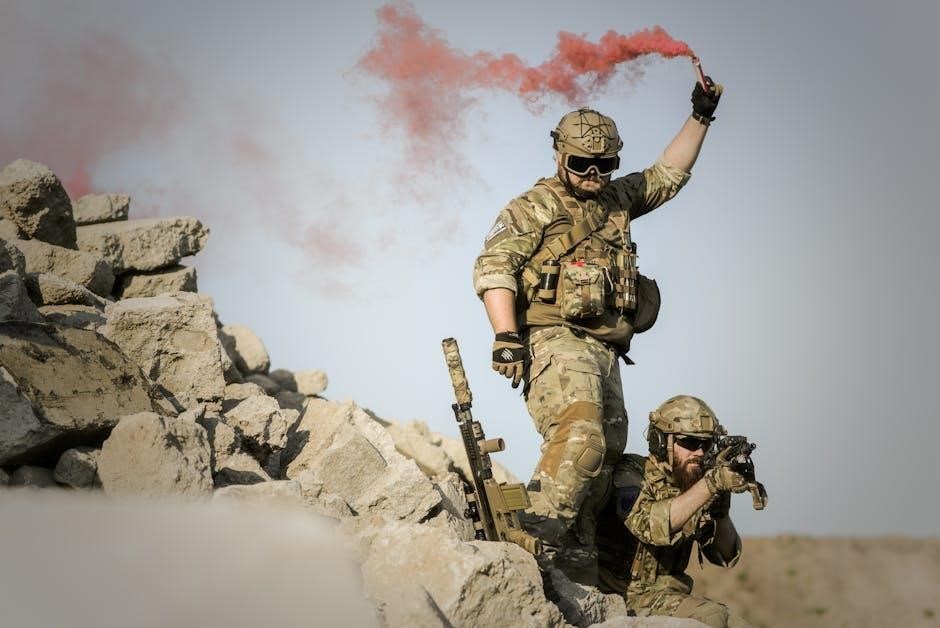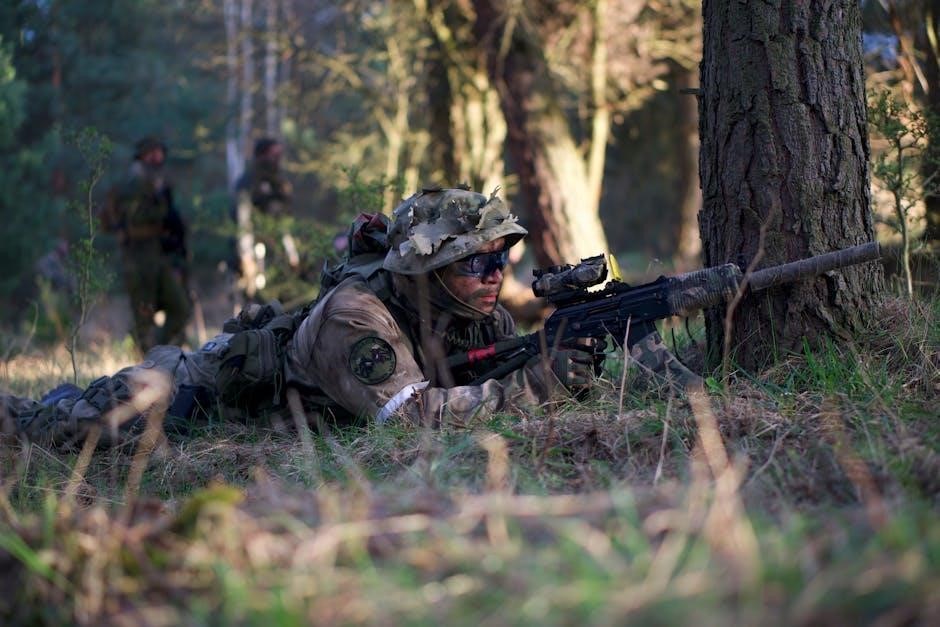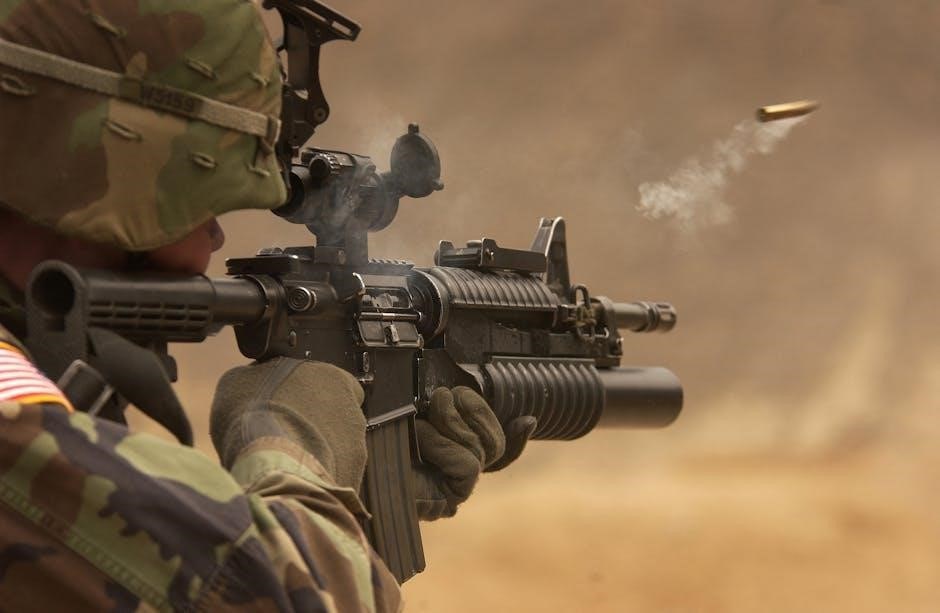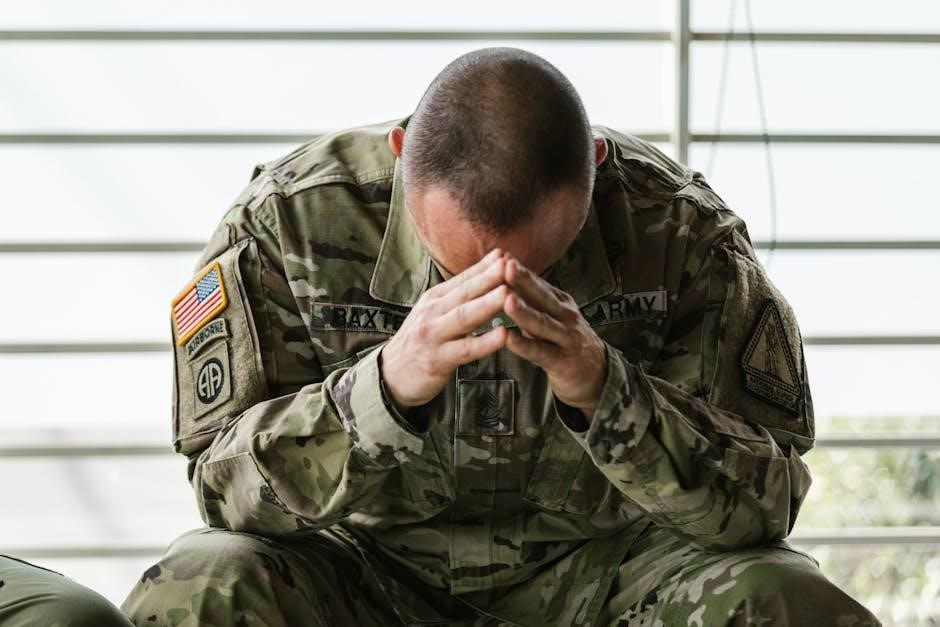Army NCO Guides provide indispensable information for today’s noncommissioned officers, serving as a ready reference for leadership, supervision, and Soldier care across all Army components․ They establish standards to help NCOs understanding of responsibilities․
The Army NCO Guide serves as a foundational resource, especially vital for newly appointed noncommissioned officers․ This manual provides critical information essential for NCO success, encompassing leadership principles, supervisory techniques, and Soldier welfare․ Junior officers also find value in understanding the guide’s contents․ The NCO Guide offers practical guidance and knowledge to establish standards, understand duties, and effectively lead and develop subordinates, promoting a culture of excellence and readiness within the Army ranks, as NCOs adapt to modern warfare․
Purpose of NCO Guides
The primary purpose of Army NCO Guides is to equip noncommissioned officers with the knowledge and tools necessary for effective leadership, supervision, and the well-being of Soldiers․ These guides offer a ready reference for navigating diverse situations, establishing clear standards, and understanding the multifaceted duties and responsibilities inherent in the NCO role․ Furthermore, NCO guides aim to foster professional development, enabling NCOs to lead and develop subordinates effectively, while adapting to evolving challenges and maintaining the Army’s standards of excellence and readiness, and also provide benefits and resources․
Importance for NCOs and Junior Officers
Army NCO Guides are critically important for both noncommissioned officers and junior officers, serving as vital resources for understanding leadership principles, responsibilities, and Army standards․ For NCOs, these guides offer practical guidance on leading, supervising, and caring for Soldiers, establishing discipline, and fostering professional development․ Junior officers benefit by gaining insight into the NCO Corps, their duties, authority, and how to effectively collaborate with them․ These guides facilitate mutual respect and understanding, leading to stronger officer-NCO partnerships and improved mission success by providing resources and benefits․

History and Background
Understanding the history and background of the Army NCO Corps is essential․ It reveals the evolution of NCO roles, responsibilities, and the time-honored traditions that form the “Backbone of the Army,” as it’s proudly known․
History of the Army Noncommissioned Officer
The history of the Army Noncommissioned Officer is a story of dedication, sacrifice, and unwavering commitment to duty․ NCOs are members of a time-honored corps, known as the “Backbone of the Army,” whose roots trace back to the very founding of the United States․ Enlisted before 9/11, they have been injured and spent their final years at Walter Reed Army Medical Center․ Throughout history, NCOs have served with distinction, embodying the values and traditions that define the American Soldier․
Evolution of NCO Roles and Responsibilities
The evolution of NCO roles and responsibilities reflects the changing needs of the Army and modern warfare․ From training and leading soldiers, NCOs are charged with the care, education and readiness of every Soldier․ The NCO has adapted to modern warfare by investing in the NCO Corps through rigor and discipline developing resilience, agility, and adaptability․ NCOs are the cornerstone of the Army, supporting mission success through strong officer-NCO partnerships and maintaining standards in a changing world․

Key Concepts in NCO Leadership
Key to NCO leadership is leading, supervising, and caring for soldiers․ The NCO guide describes NCO duties, responsibilities and authority and how they relate to warrant and commissioned officers․ NCOs establish standards․
Leading, Supervising, and Caring for Soldiers
Leading, supervising, and caring for soldiers is a fundamental tenet of the Army NCO Corps․ The NCO guide provides a framework for NCOs to effectively guide, mentor, and support their subordinates․ This includes ensuring their well-being, providing professional development opportunities, and fostering a positive command climate․ NCOs are charged with the care, training, education, and readiness of every Soldier in the U․S․ Army․
NCO Authority and Responsibilities
The Army NCO Guide clearly defines the authority and responsibilities entrusted to noncommissioned officers․ NCOs are responsible for upholding standards, maintaining discipline, and ensuring the welfare of their soldiers․ Their authority stems from their rank, experience, and the trust placed in them by the Army․ Understanding this authority, and wielding it responsibly, is critical for effective leadership and mission accomplishment within the NCO corps․
Relationship with Warrant Officers and Commissioned Officers
The Army NCO Guide elucidates the crucial relationships between NCOs, warrant officers, and commissioned officers․ These relationships are built on mutual respect, trust, and understanding of each other’s roles․ NCOs provide experience and technical expertise․ Warrant officers offer specialized skills, and commissioned officers provide command and strategic vision․ A collaborative partnership is essential for mission success, where each component leverages its strengths for the benefit of the unit․

NCO Development and Training
Leader development is fundamental to Army readiness․ The Noncommissioned Officer 2020 Strategy (NCO 2020) offers guidance for developing NCOs through rigor and discipline, building resilience, agility, and adaptability for the modern battlefield․
Leader Development Strategies
The Army emphasizes leader development as crucial for maintaining readiness and effectiveness․ Strategies focus on building resilience, agility, and adaptability within the NCO Corps․ These strategies aim to equip NCOs with the necessary skills and knowledge to lead, supervise, and care for Soldiers effectively․ Furthermore, leader development incorporates professional development guidelines and training resources to enhance the NCO’s ability to establish standards, understand responsibilities, and develop subordinates․ Ultimately, these strategies contribute to a stronger, more capable NCO Corps․
NCO 2020 Strategy
The Noncommissioned Officer 2020 Strategy (NCO 2020) provides a clear vision and guidance for the future development of the NCO Corps․ This strategy outlines specific ends, ways, and means for cultivating highly competent and adaptable NCOs․ It emphasizes rigor and discipline in developing resilience, agility, and adaptability․ By focusing on these key areas, NCO 2020 aims to ensure that the NCO Corps remains a vital asset to the Army, capable of meeting the challenges of modern warfare and leading Soldiers effectively․
Professional Development Guidelines for Contracting NCOs
Revised professional development guidelines for noncommissioned officers specializing in Army contracting have been released, outlining specific pathways for career advancement and skill enhancement․ These guidelines offer a structured approach to developing expertise in contracting procedures and regulations․ They focus on enhancing the NCO’s ability to effectively manage contracts, ensuring the Army obtains necessary goods and services efficiently․ These guidelines are important for NCOs to maintain standards and lead Soldiers․
Critical Information for NCO Success
Critical information for NCO success involves establishing standards, understanding duties, and having the knowledge to lead and develop subordinates․ These elements are fundamental to effective leadership and mission accomplishment within the Army․
Establishing Standards and Discipline
Establishing firm standards and maintaining strict discipline are paramount for NCOs․ These practices build resilience, agility, and adaptability within Soldiers and units․ NCOs must lead by example, enforcing regulations and ensuring adherence to the Army values․ Consistent application of standards fosters a culture of respect, accountability, and high performance, ultimately contributing to mission readiness and success․ A disciplined environment cultivates trust and cohesion among team members, essential for overcoming challenges․
Understanding Duties and Responsibilities
A comprehensive understanding of their duties and responsibilities is crucial for every NCO․ This knowledge empowers NCOs to effectively lead, supervise, and care for their Soldiers․ NCOs must be intimately familiar with Army regulations, policies, and procedures to ensure compliance and maintain order․ They are responsible for the welfare, training, and development of their subordinates, fostering a positive and productive work environment․ A clear grasp of their role enables NCOs to make sound decisions and take appropriate action․
Knowledge to Lead and Develop Subordinates
Effective leadership hinges on the knowledge an NCO possesses to guide and cultivate subordinates․ This involves understanding individual strengths and weaknesses to tailor training and mentorship․ NCOs must impart technical expertise, instill discipline, and foster professional growth․ Providing opportunities for advancement, offering constructive feedback, and promoting a culture of continuous learning are essential․ By sharing their experience and knowledge, NCOs empower subordinates to reach their full potential and contribute to the unit’s success, building a cohesive and effective team․

Practical Guidance for NCOs
NCOs require practical guidance for daily tasks such as counseling Soldiers, understanding military justice, managing promotions, and accessing available benefits․ This section offers resources and support for NCOs to effectively lead․
Counseling Soldiers
Counseling Soldiers is a critical NCO responsibility, encompassing guidance on performance, career development, and personal well-being․ Effective counseling builds trust, fosters growth, and addresses issues impacting a Soldier’s readiness and morale․ NCOs must use self awareness, self discovery, and their leadership skills to aid subordinates․ This involves active listening, empathy, and providing constructive feedback, ultimately contributing to a stronger and more resilient Army․
Military Justice Overview
A fundamental aspect of NCO duty involves understanding the military justice system․ NCOs play a vital role in upholding discipline and ensuring fairness․ They must be conversant with regulations, procedures, and the rights of Soldiers․ NCOs must understand regulations to assist junior officers․ Their responsibilities include reporting misconduct, conducting preliminary inquiries, and advising commanders․ A solid grasp of military justice empowers NCOs to maintain order, promote accountability, and safeguard the integrity of the Army․
Promotions and Career Management
NCOs must understand the promotion system, eligibility criteria, and the evaluation process․ Guiding Soldiers on their career paths involves advising them on education, training, and professional development opportunities․ NCOs should help Soldiers with education and professional development․ Mentorship plays a crucial role, with experienced NCOs sharing insights and providing guidance․ Effective career management ensures Soldiers are well-prepared for advancement․ That contributes to a stronger, more capable NCO Corps․ NCOs who guide Soldiers can help them on their career path․
Benefits and Resources for NCOs
NCOs must be aware of the benefits available to them and their Soldiers․ This includes healthcare, education, housing assistance, and retirement plans․ Understanding these benefits enables NCOs to advise Soldiers effectively․ Numerous resources are available to support NCO development and well-being, such as professional military education, counseling services, and financial assistance programs․ Accessing these resources enhances an NCO’s ability to lead and care for Soldiers․ Knowing benefits and resources is crucial for NCOs to help themselves and others․
FM 7-22․7: The NCO Guide
FM 7-22․7 serves as a guide for leading, supervising, and caring for soldiers․ It provides a ready reference for NCOs in various situations, despite not being all-inclusive or a standalone document․
Overview of FM 7-22․7
FM 7-22․7, also known as the NCO Guide, provides Army noncommissioned officers with essential guidance on leading, supervising, and caring for Soldiers․ It is designed to be a readily accessible reference tool, offering practical advice for a wide range of situations that NCOs may encounter․ While not exhaustive, FM 7-22․7 presents fundamental principles and best practices, supporting NCOs in their critical roles within the Army․ It aids in establishing standards and understanding duties․
Key Topics Covered in FM 7-22․7
FM 7-22․7 addresses numerous key topics relevant to the daily duties and responsibilities of Army NCOs․ These areas include leadership principles, effective supervision techniques, and comprehensive approaches to Soldier care․ The guide also delves into NCO authority, responsibilities, and their relationship with warrant officers and commissioned officers․ Furthermore, it covers essential aspects of establishing standards, maintaining discipline, and understanding the duties of an NCO, providing a solid foundation for leading and developing subordinates within the Army․
TC 7-22․7: Noncommissioned Officer Guide
TC 7-22․7, the Noncommissioned Officer Guide, offers critical information for NCOs in the Active Army, National Guard, and Army Reserve․ It provides guidance for leading and caring for Soldiers․
Purpose and Scope of TC 7-22․7
The primary purpose of TC 7-22․7 is to furnish Army noncommissioned officers with a comprehensive guide for effectively leading, supervising, and ensuring the well-being of their Soldiers․ It serves as a readily accessible reference, applicable across the Active Army, Army National Guard, and Army Reserve components․ While not exhaustive, it addresses a wide range of situations NCOs may encounter, helping them establish standards, understand duties, and develop subordinates into capable leaders, ultimately contributing to mission success and Soldier readiness․
How TC 7-22․7 Complements FM 7-22․7
TC 7-22․7 and FM 7-22․7 work in tandem to equip noncommissioned officers with the knowledge and resources necessary for effective leadership․ While FM 7-22․7 offers a broad overview of NCO responsibilities and guidance, TC 7-22․7 delves deeper, providing more specific and practical applications․ TC 7-22․7 provides critical information and is intended for use by all NCOs to serve as a practical tool for daily tasks and challenges, complementing the foundational principles outlined in FM 7-22․7․

The NCO Corps: Backbone of the Army
The NCO Corps, a time-honored group, is vital to the Army․ Noncommissioned officers are the cornerstone, ensuring mission success through leadership, training, and Soldier care, embodying values of rigor and discipline․
NCO Corps Values and Traditions
The NCO Corps cherishes a history of values and traditions, integral to the U․S․ Army’s success․ These values drive NCOs to lead with resilience, agility, and adaptability․ They are charged with the care, training, education, and readiness of every Soldier․ This dedication ensures a strong foundation, supporting mission accomplishment and maintaining the Corps’ esteemed reputation as the “Backbone of the Army․” Their contributions reflect a commitment to excellence․
Importance of NCOs in Mission Success
Noncommissioned officers are the cornerstone of Army operations, playing a critical role in mission success by ensuring soldiers are trained, disciplined, and ready for any challenge․ Their leadership, adaptability, and commitment to excellence are essential for achieving objectives․ NCOs foster strong officer-NCO partnerships, further enhancing unit effectiveness․ They establish standards and provide guidance, enabling subordinates to perform at their best, ultimately contributing to the Army’s overall success in diverse and complex environments․

Resources for NCOs
NCOs can leverage various resources, including DA Pamphlet 600-25, the NCO Professional Development Guide, and other Army publications․ These provide guidance on leadership, training, career management, and benefits, supporting their professional growth and effectiveness․
DA Pamphlet 600-25: NCO Professional Development Guide
The DA Pamphlet 600-25 serves as a critical resource for NCOs, offering comprehensive guidance on professional development․ It outlines pathways for career progression, leadership skills enhancement, and educational opportunities․ This guide assists NCOs in planning their development, acquiring knowledge, and refining skills necessary for success at each stage of their careers․ It emphasizes resilience, agility, and adaptability, ensuring NCOs remain effective leaders in a constantly evolving Army, providing them with tools for self-awareness and subordinate development․
Other Relevant Army Publications and Resources
Beyond FM 7-22․7 and TC 7-22․7, numerous other Army publications and resources support NCO development and effectiveness․ These include field manuals, training circulars, and DA pamphlets covering various aspects of leadership, technical skills, and Soldier care․ Resources address military justice, counseling techniques, and career management․ They provide essential information for NCOs seeking to enhance their knowledge, skills, and abilities․ Accessing and utilizing these resources is crucial for NCOs committed to continuous professional growth and mission success, ensuring they remain well-informed and prepared․

The NCO’s Role in Soldier Readiness
NCOs are pivotal in Soldier readiness through training, education, and welfare․ They establish standards, understand duties, and utilize their knowledge to develop subordinates, ensuring a prepared and capable force for any mission․
Training and Education of Soldiers
NCOs are directly responsible for the training and education of Soldiers, developing resilience, agility, and adaptability․ They use tools like self-awareness and discovery to enhance leadership, focusing on how they lead and develop subordinates․ Effective training involves establishing clear standards and ensuring Soldiers understand their duties and responsibilities․ NCOs are crucial in preparing Soldiers for modern warfare and maintaining overall readiness․
Maintaining Soldier Welfare and Readiness
NCOs play a pivotal role in maintaining Soldier welfare and readiness, ensuring their physical and mental well-being․ This involves providing necessary resources and support, addressing concerns, and fostering a positive environment․ NCOs must ensure Soldiers are prepared for duty, both in garrison and deployed environments, by implementing programs and practices; They are charged with the care of every soldier in the U․S․ Army․

Officer-NCO Partnerships
Strong Officer-NCO partnerships are critical for mission success, built on mutual respect and understanding․ These partnerships capitalize on the distinct skills and experience each brings, fostering effective teamwork and a cohesive unit․
Building Strong Working Relationships
Constructing robust working relationships between officers and NCOs hinges on clear communication and a shared understanding of roles․ Mutual respect, valuing each other’s expertise, is paramount․ Officers should empower NCOs, fostering trust and open dialogue․ NCOs, in turn, must provide candid feedback and unwavering support․ This collaborative environment is essential for mission accomplishment and the overall well-being of the unit, creating a synergy that enhances effectiveness․
Mutual Respect and Collaboration
Fostering mission success relies heavily on mutual respect and collaboration between officers and NCOs․ Recognizing the distinct expertise each brings to the table is crucial․ Officers must value NCO experience, and NCOs must support officer leadership․ Open communication, active listening, and a willingness to learn from each other are essential․ This collaborative approach creates a synergistic environment, enhancing team effectiveness and ensuring mission objectives are achieved through shared understanding and unified effort․

Contemporary Challenges for NCOs
NCOs today face challenges adapting to modern warfare and maintaining standards amidst a changing Army․ Developing resilience, agility, and adaptability are crucial for navigating these evolving complexities successfully․
Adapting to Modern Warfare
The contemporary operational environment presents multifaceted challenges, demanding that NCOs demonstrate adaptability and innovation․ Modern warfare necessitates a deep understanding of evolving technologies, cyber threats, and unconventional tactics․ NCOs must cultivate critical thinking skills and foster a culture of continuous learning within their teams to effectively address these dynamic challenges․ Furthermore, they need to be proficient in integrating new technologies and adapting strategies to maintain operational effectiveness in complex scenarios, ensuring mission success in the face of modern threats․
Maintaining Standards in a Changing Army
In a constantly evolving Army, maintaining standards and discipline requires unwavering commitment from NCOs․ As the Army adapts to new technologies, diverse personnel, and changing societal norms, NCOs must uphold core values and enforce regulations consistently․ They must address challenges related to morale, conduct, and performance through effective counseling, mentorship, and leadership․ By setting a positive example and holding Soldiers accountable, NCOs ensure the Army’s traditions of excellence and professionalism remain strong, fostering a culture of respect and discipline․
The NCO Guide remains a vital tool, assisting in establishing standards and understanding duties․ It’s a knowledge base to lead and develop subordinates, ensuring the NCO Corps continues to be the backbone of the Army․
The Enduring Importance of the NCO Guide
The NCO Guide, particularly FM 7-22․7 and TC 7-22․7, remains an enduring cornerstone for noncommissioned officers․ It is critical for leading, supervising, and caring for soldiers, providing a ready reference for diverse situations․ These guides assist in establishing standards, understanding duties, and developing subordinates․ By fostering resilience, agility, and adaptability, the NCO Guide ensures the NCO Corps remains the backbone of the Army, ready to meet contemporary challenges and maintain mission success in a changing world․
The Future of NCO Leadership in the Army
The future of NCO leadership hinges on adapting to modern warfare’s complexities, supported by robust leader development strategies like NCO 2020․ NCOs must continue to embody the Army’s values and traditions while maintaining standards in a changing environment․ Investing in NCOs through rigorous training, resilience-building, and agility development is paramount․ Strong officer-NCO partnerships, built on mutual respect, will be crucial․ By embracing innovation and upholding discipline, NCOs will ensure the Army’s continued success in the 21st century and beyond․
